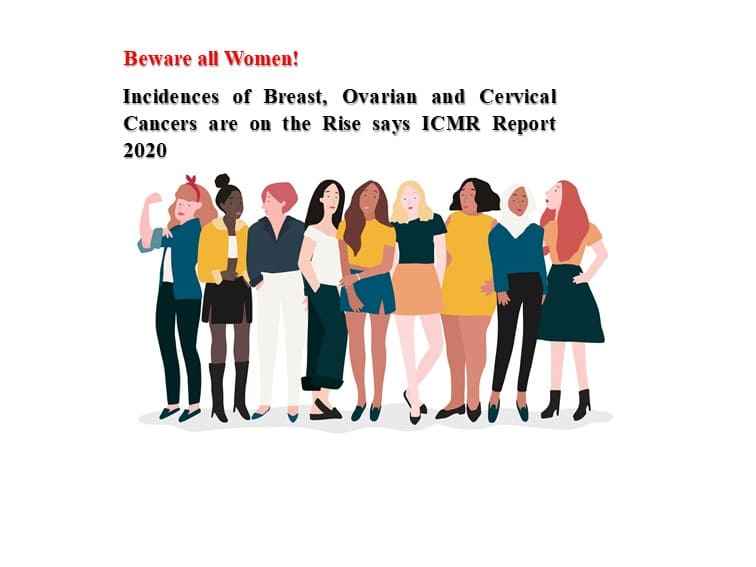Cancer cases in India 2020: For every 2 women newly diagnosed with breast cancer, one woman dies of it in India. For every 8 minutes in India, one woman dies of cervical cancer. In addition, ovarian cancer is the third leading cause of deaths in India.
Indian Council of Medical Research (ICMR) released The National Cancer Registry Programme Report 2020. According to this report, there will be 13.9 lakh cases of cancer in India in 2020. And the number of cancer cases are likely to grow up to 15.7 lakhs by 2025.
Cancer cases in India 2020 – Breast cancer incidences are increasing
Breast cancer is expected to be the most common cancer in women in India. The National Cancer Registry Programme Report 2020 also says the incidence of breast and ovarian cancer is on the rise. The highest burden of breast cancer was observed in metropolitan cities such as Hyderabad, Chennai, Bengaluru and Delhi.
According to “The National Cancer Registry Programme Report 2020” breast, ovarian and uterine cancers were the most common cancers among women while stomach, mouth, lungs and oesophageal cancers were the most common among men.
Breast, Ovarian and Cervical Cancers are being Detected Late in India – Know the reasons to fight Back
All major types of gynaecological cancers – such as breast cancer, cervical cancer and ovarian cancers are being detected late – in the advanced stages (3rd and 4th stages). Therefore, even those women who think that they are healthy, it’s time to pay attention and become extra cautious as far as gynaecological cancers – such as breast, ovarian and cervical cancers are concerned.
In India, late detection of cancer is a major concern, rather a big hurdle in the effective management of cancer – owing to which five-year survival rates are falling down. In addition, the cost of treatment is also rising. Still, advanced-stage cancer detection is rampantly prevalent in India.
Are We Fighting Ovarian Cancer the Right Way?
For effective treatment of any type of cancer or for better treatment outcomes – the one thing which is very important is early detection by means of proper screening tests. For gynaecologists, female surgical oncologists, scientists, researchers and oncologists in general, screening women who are potentially at risk of developing ovarian cancer is a bit trivial as there is no proper screening test available for ovarian cancer screening. Experts are aware of the fact that early detection can make a huge difference in treatment outcomes. Therefore, they are working aggressively to reach to certain ways of screening women for ovarian cancer. In this regard, major research studies are being carried out throughout the repeated research centres of the word to find novel ways of detecting ovarian cancer in women. In addition to DNA based, genetic studies and analysis, the study of protein sequence, patterns and folding (proteomics) is gaining momentum. Still, there is a long way to go.
What is the solution?
Early detection of any type of cancer in women ensures effective and comprehensive treatment, but certain types of breast and ovarian cancers spread rather silently and asymptomatically – owing to which they are not detected early. Ovarian cancer in particular is the most challenging and difficult to detect cancer as there are no screening tests available for this type of cancer.
Mass awareness and better use of available screening tests and annual women health check-ups can help in managing the rising incidences of ovarian cancer and preventing it. If ovarian cancer is detected early, the treatment becomes immensely effective.
Bottom Line
Uterine, cervical and breast cancers can be detected early through screening tests. Annual health checks and general health check-ups can also help in detecting gynaecological cancers early. Early detection and diagnosis ensure effective treatment – thus significantly improving the survival rates for breast, ovarian, uterine and cervical cancers. Source: cancer cases in India 2020
Dr Rajeshwari Reddy
Senior Consultant Gynaecologist, Obstetrician and Laparoscopic Surgeon





